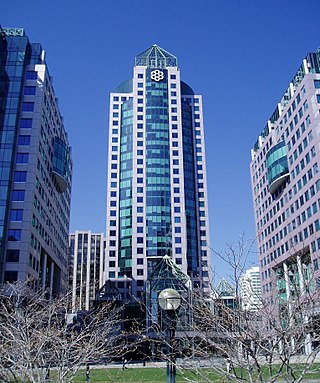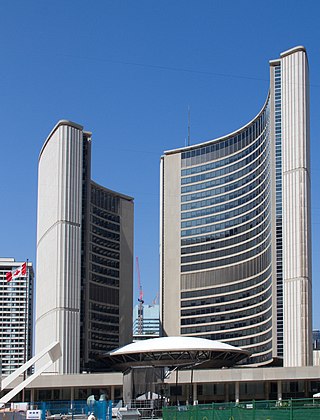Related Research Articles

The Greater Toronto Area, commonly referred to as the GTA, includes the City of Toronto and the regional municipalities of Durham, Halton, Peel, and York. In total, the region contains 25 urban, suburban, and rural municipalities. The Greater Toronto Area begins in Burlington in Halton Region to the west, and extends along Lake Ontario past downtown Toronto eastward to Clarington in Durham Region.
Chris Stockwell was a Canadian politician from Ontario. He was a Progressive Conservative member of the Legislative Assembly of Ontario from 1990 to 2003, and served as Speaker of the legislature and cabinet minister in the governments of Mike Harris and Ernie Eves. Before entering provincial politics, he had been a member of Etobicoke City Council and the Metro Toronto Council. Stockwell's father, Bill Stockwell, was also a prominent municipal politician.
The phrase Common Sense Revolution (CSR) has been used as a political slogan to describe conservative platforms with a main goal of reducing taxes while balancing the budget by reducing the size and role of government. It has been used in places such as Australia and Canada. This article deals with the "Common Sense Revolution" as it was under Ontario Premier Mike Harris and the Progressive Conservative Party of Ontario from 1995 to 2002.

The Municipality of Metropolitan Toronto was an upper-tier level of municipal government in Ontario, Canada, from 1953 to 1998. It was made up of the old city of Toronto and numerous townships, towns and villages that surrounded Toronto, which were starting to urbanize rapidly after World War II. It was commonly referred to as "Metro Toronto" or "Metro".

Toronto City Council is the governing body of the municipal government of Toronto, Ontario. Meeting at Toronto City Hall, it comprises 25 city councillors and the mayor of Toronto. The current term began on November 15, 2022.

The mayor of Toronto is the head of Toronto City Council and chief executive officer of the municipal government. The mayor is elected alongside city council every four years on the fourth Monday of October; there are no term limits. While in office, mayors are styled His/Her Worship.

York County is a historic county in Upper Canada, Canada West, and the Canadian province of Ontario. It was organized by the Upper Canada administration from the lands of the Toronto Purchase and others.

Peter Zygmunt Milczyn is a former politician in Ontario, Canada. He was a Liberal member of the Legislative Assembly of Ontario from 2014 to 2018 who represented the west Toronto riding of Etobicoke—Lakeshore. He was a member of cabinet in the government of Kathleen Wynne. He was Minister of Housing from 2017 to 2018. Previously, he was a city councillor in Toronto, Ontario from 2000 to 2014.

The Chairman of the Municipality of Metropolitan Toronto or Metro Chairman was the regional chair of Metropolitan Toronto, Ontario, Canada, and the most senior political figure in the municipality. The Metro Chairman was elected by the members of Metropolitan Toronto Council.

The politics of Toronto, Toronto, Ontario, Canada involve the election of representatives to the federal, provincial, and municipal levels of government. A total of 25 Members of Parliament (MPs) representing Toronto sit in the House of Commons of Canada in Ottawa, and another 25 Members of Ontario's Provincial Parliament (MPPs) sit in the Legislative Assembly of Ontario at Queen's Park, in Toronto. Being Ontario's capital, many provincial offices are located in the city.

The municipal government of Toronto is the local government responsible for administering the city of Toronto in the Canadian province of Ontario. Its structure and powers are set out in the City of Toronto Act.

The amalgamation of Toronto was the creation of the city limits of Toronto, Ontario, Canada after amalgamating, annexing, and merging with surrounding municipalities since the 18th century. The most recent occurrence of amalgamation was in 1998, which dissolved the federation of Metropolitan Toronto and its constituent municipalities, and created the current "megacity" of Toronto.
Municipal elections were held in Toronto, Ontario, Canada, on December 5, 1966. The elections were the first in Toronto after its merger with several smaller suburban communities on January 1, 1967. Forest Hill and Swansea were annexed by the City of Toronto, Leaside was merged with the Township of East York to become the Borough of East York. Weston was combined with the Township of York to form the Borough of York. The Village of Long Branch and the towns of Mimico and New Toronto were merged with the Township of Etobicoke to form the Borough of Etobicoke.

The Parliament of the Province of Canada was the legislature for the Province of Canada, made up of the two regions of Canada West and Canada East.
William Beverley Lewis was a politician in Ontario, Canada. He was a Progressive Conservative member from 1955 to 1967 who represented the riding of Humber.
Ann Marie Curtis, née McCarthy, was a Canadian politician, who served as the reeve of the Toronto suburb of Long Branch, Ontario from 1953 to her retirement in 1962. She was the first, and only, woman to become reeve of Long Branch. She and Dorothy Hague of the Village of Swansea were the first women to become reeves or mayors in the Toronto area, both taking office for the first time on January 1, 1953. As reeve, she also served on Metropolitan Toronto Council from its creation in 1953 until 1962 and was the first woman on its executive.

Yvan Baker is a Canadian politician who was elected to represent the federal riding of Etobicoke Centre in the 2019 federal election and in the 2021 Canadian federal election. He is a member of the Liberal Party of Canada. Prior to entering federal politics, he served as the Liberal member of the Legislative Assembly of Ontario for the provincial riding of Etobicoke Centre from 2014 to 2018.

The 42nd Legislative Assembly of Ontario was a legislature of the province of Ontario, Canada. The membership was set by the 2018 Ontario general election and sat for two sessions until it was dissolved on May 3, 2022 in advance of the 2022 Ontario general election.
References
- ↑ Ontario 1953, pp. 405–502.
- ↑ Ontario 1953, p. 405.
- ↑ Ontario 1953, p. 446.
- ↑ Ontario 1953, p. 406.
- ↑ Ontario 1953, pp. 419, 425–427, 431–432, 442–446, 448, 450–453, 456–459, 462, 465–466, 468, 471–472, 475–476, 479, 497, 500–501.
- ↑ "Legislative Assembly of Ontario. Library". Archived from the original on February 28, 2006.
- ↑ "Stronger City of Toronto for a Stronger Ontario Act, 2006 /Loi de 2006 créant un Toronto plus fort pour un Ontario plus fort". Parliamentary Debates (Hansard) . Vol. 38. Ontario: Legislative Assembly of Ontario. June 12, 2006.
The Clerk of the Assembly (Mr. Claude L. DesRosiers): The ayes are 58; the nays are 20.
The Speaker: I declare the motion carried. Be it resolved that the bill do now pass and be entitled as in the motion. - ↑ City of Toronto: Former Mayor David Miller 2003–2010 – Speech: Standing Committee on General Government Bill 53, Stronger City of Toronto for a Stronger Ontario Act. Toronto.ca. Retrieved on July 26, 2013.